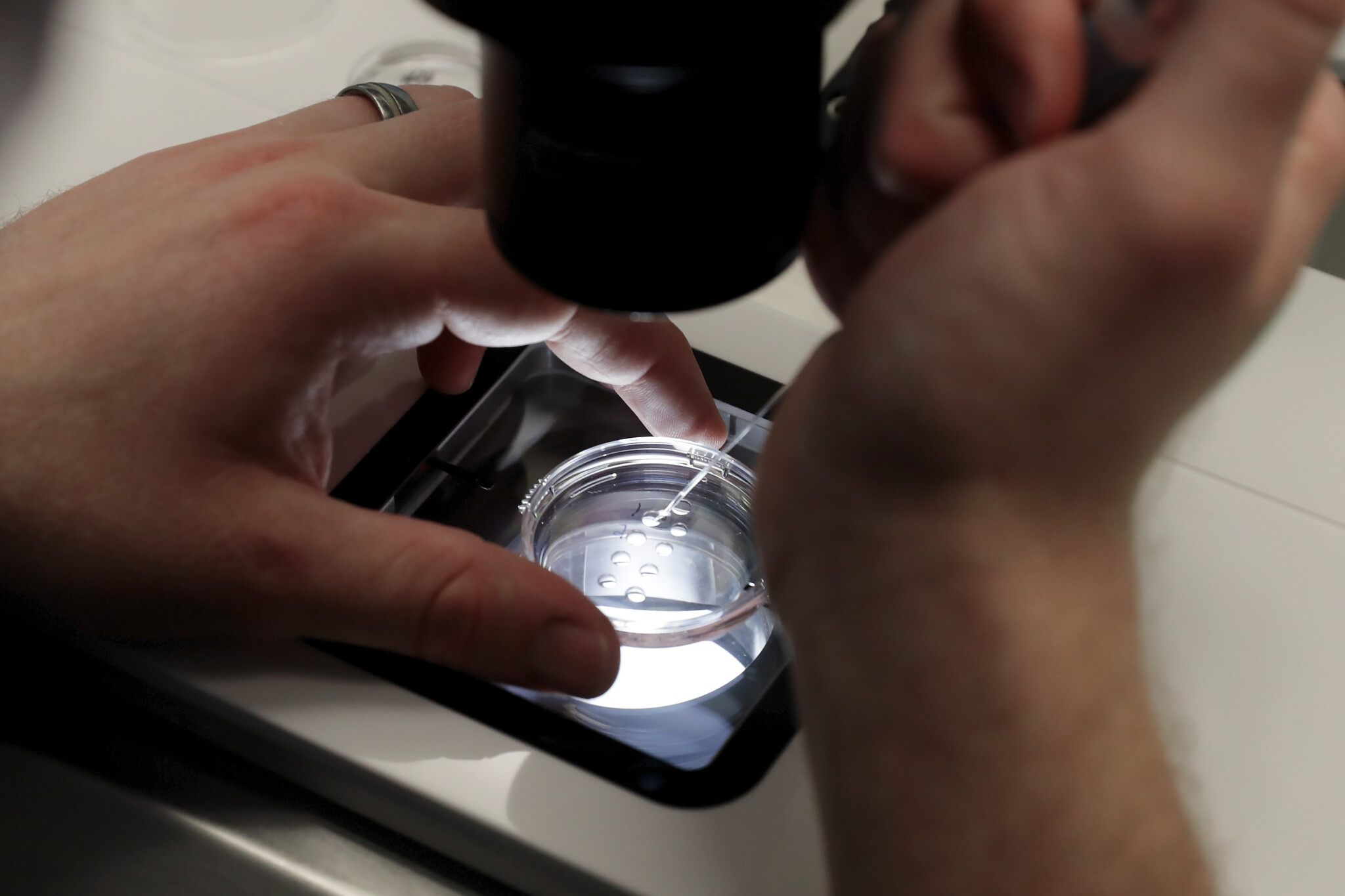It was easy to miss a minor blip in the cacophonous “great give-away” during this year’s federal election: the Liberal Party’s promise to expand financial support for in vitro fertilization (IVF) under the umbrella of its “Pathways to Parenthood” plan, which earmarked $400 million to ease access to the service. The monies will be disbursed through a series of payments (up to $20,000 per person) for a single round of treatment. The goal is, in part, to make IVF equally accessible across the nation.
But the government is also responding to the increasingly well-documented disparity between people’s desire for children and their ability to fulfill these aspirations. In an economic context often cited as hostile to childbearing, relieving any financial barriers to family life is as good a place to start as any when it comes to framing family-forward policy.
And so to raise concerns about the Liberal plan may well appear incomprehensible, if not cruel. Given the proximity that many of us share with people for whom IVF has made the dream of family a reality, and the beautiful children that we know born via IVF, the expansion of access to reproductive technologies seems an obvious win.
And yet there are at least two grounds for concern with the Liberal promise.
Confronting the reality
On the one hand, and most obviously, an argument is required to justify why this health care intervention, and not another, deserves such a large one-time financial commitment in the context of a system with substantial gaps in primary care, lengthy wait times, limited options for triaging mental health concerns, and more. In a world of endlessly expanding health coverage, righting the sinking ship of universal care may require a politically unpopular reimagining of what constitutes essential health services.
On the other hand, and of far more consequence, the Liberal plan injects money into a technology whose moral complexities continue to compound. These complexities have recently come to the fore through the high-profile advocacy of Silicon Valley pro-natalists, from Sam Altman to Elon Musk, to the remarkably idiosyncratic Malcolm and Simone Collins. Their support of IVF extends well past the hope that it offers a possibility of children to the childless. Rather, their pro-natalism sees in IVF and related technologies the promise of optimizing for specific genetic traits, from higher IQ to decreased risk of Alzheimer’s. The hopeful promise of children-for-all embedded in the IVF dream is already, then, ceding ground to the startlingly dystopian practice of picking and choosing acceptable genetic material as a necessary feature of family planning. Or, to put it another way: eugenics.
This is not, of course, the orientation that most families bring to IVF. Rather, for many, IVF is a last hope for biological children that comes at the end of an anguish-filled and prolonged struggle. These families have little concern for the kinds of futuristic genetic play pursued by a fringe movement of American pro-natalists who, like Musk, are inclined to choose IVF even when conceiving children naturally is entirely possible.
Nonetheless, the reality of what this practice entails must be confronted as the technology progresses. The ethical complexity of IVF treatment has increased alongside the growing sophistication of pre-implantation genetic screening and diagnoses. In Canada, for example, pre-implantation diagnoses of embryos conceived via IVF may now track over 400 genetic conditions. The advanced screening is meant to flag what one paper classifies as diseases, conditions, or disabilities that may impact bringing a child to term or the life of a child after birth. In the largely therapeutic language of most IVF clinics, these diagnoses allow families to make informed decisions in the context of a larger “genetic journey.”
But beneath the lifestyle language that is part and parcel of marketing IVF services, the scope for informed decision-making for families is increasingly too much and yet not enough. For example, constitutive features of the IVF process render certain kinds of birth nearly impossible without any real reference to parental desire. Grace Fertility Clinic in British Columbia, which is representative of practices across the country, effectively prohibits the implantation of embryos with any chromosomal abnormality, including Down Syndrome. The rationale is that these embryos are statistically less likely to come to term.
This is true. And yet, it is crucial to understand that clinical decisions of this kind perform an end run around the hard work of moral deliberation by making medical efficiency a primary determinant of birth. What works best for the technology determines what “works” with respect to pregnancy. The technology, to borrow a phrase, becomes a destiny for parent and child alike, with consequences that are as social as they are personal. As we see in the case of abortion in Canada (where 90 percent of pregnancies with diagnoses of Downs are terminated), so we see in the case of IVF: ostensibly personal decisions determine, quite literally, the face of the nation.
A moral minefield
For the ordinary family, the kind of information now available through pre-genetic screening and diagnosis thrusts them into a moral minefield. Does support for the inclusion of disabled children in public schools include the willingness to have a disabled child of one’s own? Does ranking embryos relative to favourable traits (or, at least, against those deemed unfavourable) presuppose a set of assumptions about what kinds of life are worth living? If we may choose against embryos with certain anticipated problems, why not also choose for eye colour, hair colour, and various other predispositions? Americans can, and some do.
In Canada, the problems are no doubt not yet so extreme. Nonetheless, one can see on the horizon a moral crisis with which the nation may or may not be willing to reckon.

Parents hold their newborn son in Halifax on Wednesday, Dec. 23, 2020. Andrew Vaughan/The Canadian Press.
As the president of the Hastings Centre, Vardit Ravitsky, notes, the power of new predictive technologies in the world of reproductive tech has at least two consequences. Firstly (and already evident in the language used by IVF clinics), these technologies incline medical practitioners and families to optimize embryos in pursuit of a healthy baby.
The moral cost of this optimization emerges when the tech is used not only to identify, say, an illness for which a family may wish to prepare themselves, but when it is further used to make assertions about other medically irrelevant traits, such as temperament and school performance.
Secondly, screening is a powerfully persuasive moral tool. When one can screen for real or perceived ailments, the moral assumption quickly becomes that one ought to. The upshot is that screening becomes a social expectation that places a premium on maximizing child health, but without a robust consideration of what really constitutes health. Is it just the absence of a cleft palate or a predisposition to kidney disease?
The Canadian case
The Canadian tendency with respect to most life issues is to assume that folks will behave well, whatever that means, and that what the law sanctions must be moral. Pushed, we often suggest that folks should just do what is best for them. But these default and generally positive assessments of authority and personal integrity, as lovely as they are, are not only naïve, they have also resulted in a complete lack of nuance in the Canadian discussion of early and end-of-life care.
The absence of abortion-related legislation, for example, and the country’s doors-wide-open MAID policy, indicate a nation out of step with even its most progressive allies. Indeed, the permissiveness and lax administration of Canada’s MAID policy have made Canada an international outlier (until, at least, recent developments in the U.K.).
Why should we expect this issue to play out any differently?
What Michael Hanby notes with respect to America is no doubt true of Canada as well: “The almost complete lack of reflection on the normalization of assisted reproductive technologies for producing children is a telling sign of the unseriousness of our age.”
One might see the language of the government’s 2004 IVF guidelines as part of the problem. That a nation can reductively refer to sperm and ova simply as “reproductive material” and fail to engage with the growing moral conundrums inherent in IVF technology, is a nation for which the mystery of life has been subordinated (at least at the level of public policy) to a technological and materialist worldview. This is despite the fact that few of us see our children as simply matter-in-motion. More strange still is the language around social egg freezing as a biology hack. Whatever the moral weight of the decision, the process is marked by the language of conquest over nature that in other contexts rightly raises profound and sustained concern.
While Canadians rightly focus our attention on questions of economic health, employment, and housing, it may also be time for the nation to recall that a country is not simply the sum total of its economic successes. These help, no doubt. But we already enjoy a wealth and security that is historically unprecedented, and none of it has prevented widespread and growing unhappiness, mental illness, and loneliness. Unless there is a vision of what life may be for, quite apart from material success, the nation’s wealth will only be squandered.
Rather than taking a position on IVF in Canada, the aim of these observations is to stimulate a public conversation. The alternative is sleepwalking into dystopian futures. This conversation requires a willingness to think beyond prosperity to questions of ultimate ends. It is in light of these ends that we may be able to think coherently about the moral issues that percolate beneath, for example, reproductive technologies. The failure to do so is just as grave a crime against the next generation as the many material failures we will pass on.










